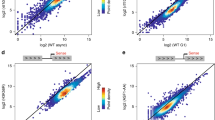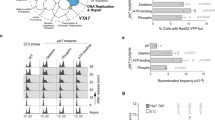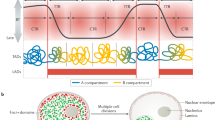Abstract
RECENT investigations have revealed1 that the ratio of total histones to DNA is not significantly different within either the repressed or active chromatin fractions isolated from interphase calf thymus lymphocytes2. In addition, the relative proportions of each of the distinct types of histones are similar within both forms of chromatin1. These results confirm a similar constancy of the types and quantities of histones found previously within animal cells varying widely in their tissue of origin3, age4, rate of RNA synthesis4, or neoplastic character5,6. Although histones are potent repressors of the template function of DNA in vitro7,8, this constancy of histone type and quantity suggests that they are a necessary, but not sufficient, mechanism for effecting the differential rates of RNA synthesis observed within the nuclei of these animal cells2,9.
This is a preview of subscription content, access via your institution
Access options
Subscribe to this journal
Receive 51 print issues and online access
$199.00 per year
only $3.90 per issue
Buy this article
- Purchase on Springer Link
- Instant access to full article PDF
Prices may be subject to local taxes which are calculated during checkout
Similar content being viewed by others
References
Frenster, J. H., Nature, 206, 680 (1965).
Frenster, J. H., Allfrey, V. G., and Mirsky, A. E., Proc. U.S. Nat. Acad. Sci., 50, 1026 (1963).
Phillips, D. M. P., Prog. Biophys. and Biophys. Chem., 12, 211 (1962).
Dingman, C. W., and Sporn, M. B., J. Biol. Chem., 239, 3483 (1964).
Laurence, D. J., Simpson, P., and Butler, J. A. V., Biochem. J., 87, 200 (1963).
Busch, H., and Steele, W. J., Adv. Cancer Res., 8, 41 (1964).
Frenster, J. H., Allfrey, V. G., and Mirsky, A. E., Biochim. Biophys. Acta, 47, 130 (1961).
Huang, R. C., and Bonner, J., Proc. U.S. Nat. Acad. Sci., 48, 1216 (1962).
Littau, V. C., Allfrey, V. G., Frenster, J. H., and Mirsky, A. E., Proc. U.S. Nat. Acad. Sci., 52, 93 (1964).
Loeb, P. M., and Wilson, J. D., Clin. Res., 13, 45 (1965).
Magasanik, B., in The Nucleic Acids, edit. by Chargaff, E., and Davidson, J. N., 1, 375 (Academic Press, New York, 1955).
Hadjivassiliou, A. G., and Brawerman, G., Fed. Proc., 24, 664 (1965).
Geiduschek, E. P., Tocchini-Valentini, G. P., and Sarnot, M. T., Proc. U.S. Nat. Acad. Sci., 52, 486 (1964).
Bassel, A., Hayashi, M., and Spiegelman, S., Proc. U.S. Nat. Acad. Sci., 52, 796 (1964).
Green, M. H., Proc. U.S. Nat. Acad. Sci., 52, 1388 (1964).
Opara-Kubinska, Z., Kubinski, H., and Szybalski, H., Proc. U.S. Nat. Acad. Sci., 52, 923 (1964).
Printz, M. P., and von Hippel, P. H., Proc. U.S. Nat. Acad. Sci., 53, 363 (1965).
Author information
Authors and Affiliations
Rights and permissions
About this article
Cite this article
FRENSTER, J. A Model of Specific De-repression within Inter phase Chromatin. Nature 206, 1269–1270 (1965). https://doi.org/10.1038/2061269a0
Issue Date:
DOI: https://doi.org/10.1038/2061269a0
This article is cited by
-
Mast cell activation and tissue cell proliferation
Cell and Tissue Research (1976)
-
Ultrastructural Probes of Chromatin within Living Human Lymphocytes
Nature New Biology (1972)
-
Condensation of interphase chromatin in caffeine-treated cells
Die Naturwissenschaften (1972)
-
Untersuchungen über altersabhängige Veränderungen der Säurelabilität des Nucleoproteids
Virchows Archiv B Cell Pathology (1969)
-
Cytophotometrische Untersuchungen des DNS-, Histon- und Gesamtproteingehalts von Epitheloidzellen, Gewebsmastzellen und von Zellen der Plasmocytopoiese bei käsiger Lymphknotentuberkulose
Klinische Wochenschrift (1967)
Comments
By submitting a comment you agree to abide by our Terms and Community Guidelines. If you find something abusive or that does not comply with our terms or guidelines please flag it as inappropriate.



